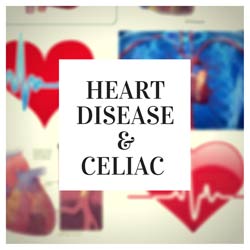What you should know about the connection between celiac and heart disease
February 9, 2015 by Amy Leger | G+ Amy Leger February is a big month for the heart. Sure, Valentine’s Day is less than a week away. But it is also American Hearth Month and The American Heart Association has the Go Red for Women campaign to raise awareness about women and heart disease.
February is a big month for the heart. Sure, Valentine’s Day is less than a week away. But it is also American Hearth Month and The American Heart Association has the Go Red for Women campaign to raise awareness about women and heart disease.
While smoking, our diets, lack of exercise and hypertension definitely contribute to heart disease, researchers also say celiac can also be a factor.
A study published by the American College of Cardiology in March of 2014 looked into celiac and heart disease. It reported “People with celiac disease may have a near two-fold increased risk of coronary artery disease compared with the general population”.
R.D. Gajulapalli, M.D., clinical associate at the Cleveland Clinic and co-investigator of the study explained, “People with celiac disease have some persistent low-grade inflammation in the gut that can spill immune mediators into the bloodstream, which can then accelerate the process of atherosclerosis and, in turn, coronary artery disease.”
“Our findings reinforce the idea that chronic inflammation, whether it’s from an infection or a disease, can have an adverse role in coronary artery disease and heart health in general,” Gajulapalli said.
In 2011 another study Published in the American Heart Association’s Circulation, linked celiac disease or small intestinal inflammation are linked with ischemic heart disease.
A report in Practical Gastroenterology in 2006, explained the high fat content that can be associated with some gluten-free foods really needs to be looked at when it comes to cardiovascular disease. It goes on to explain how a gluten-free diet can be managed — in a heart healthy way.
If you are interested in moving your gluten-free diet in that direction, that means (basically), that you eat lean proteins and cut off the fat. Eggs (with yolks) no more than 2-3 times a week, fruits and vegetables and lots of fat free foods like yogurt, cheese and salad dressing. In those situations, watch the ingredient labels. It seems that when companies make something fat free (or sugar free or other major modification) they usually substitute it with something else — which could be gluten. Just like when our gluten-free food is made, sometimes when manufacturers remove the gluten, they compensate by adding fat and/or sugar.
If you would like to learn more about celiac and heart health, check out the Celiac Disease Foundation’s webinar happening this Wednesday, February 11th. Experts will talk about gluten in medication as well as heart health.
Tags: artery, cardiovascular, celiac, coronary, diet, disease, free, gluten, health, heart



Leave a Reply